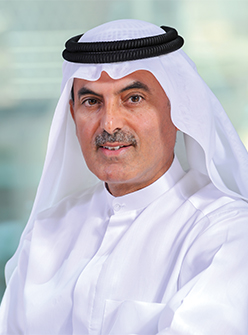Q: To what extent has the introduction of the UAE Banks Federation’s [UBF’s] Information Sharing and Analysis Centre improved United Arab Emirates banks’ ability to handle cyber threats?
A: Cybersecurity remains one of the top risks to financial institutions. As banks continue to embed a culture of risk management across the industry, we are also seeing the introduction of international standards and risk management frameworks which are being aligned to effectively manage cybersecurity risks. [These] international standards, including ISO 27001, as well as local guidance from the National Electronic Security Authority, [are providing] relevant direction to UAE banks.
In addition, the UBF’s Information Sharing and Analysis Centre offers banks a platform for sharing information related to emerging threats. The UBF information security committee believes that collecting cyber intelligence is an important part of fighting the cyber threat. The committee has recognised that even though most banks are currently accessing the platform to retrieve information, banks have been slow to share information with the platform. It is a journey and we are getting there.
Q: What impact is the use of artificial intelligence [AI] having on the UAE’s banking sector?
A: Primarily, AI will help UAE banks save time and money through the use of algorithms to generate insights, improve customer service, and make predictions about company sales performance and churn. It also optimises human work more effectively by filtering key information from a wide variety of sources. For example, a sophisticated search functionality by a customer service robot app, enabled with AI technology, leverages natural language processing to find and track relevant information to assist a customer query in the most precise fashion. Learning from successes and mistakes with each search will make this technology more accurate and contextual.
Within the wealth management arena, where investment advice via humans is an expensive and time-consuming service, especially for the personal banking segment, AI can help manage and augment rules and trading decisions, process data and create algorithms that manage the trading rules.
AI adoption in this region is in its nascent stage at the moment; all the initiatives are at conceptual levels across the UAE banking sector and they are being introduced on an experimental basis. On the other hand, digitisation has grown exponentially, and almost 80% of the top 10 banks in this region have digitised the majority of their customer-facing channels.
Q: In what ways will the implementation of VAT affect UAE banks?
A: The implementation of VAT in the UAE envisages that banks will have both exempt and taxable supplies. It would affect banks in certain ways where basic banking margin-based products such as deposits and loans are exempt, while fee-based products are taxable. VAT incurred on common costs will not be fully claimable and would need to be apportioned. Banks will tend to recover only a small percentage of the total VAT cost incurred on an exempt category. Thus, costs are expected to increase for banks as a result of VAT and thereby affect the bottom line, which we believe will be well absorbed and managed by the banks themselves. Overall, VAT is not expected to affect the performance and competitiveness of the banks given the reasonable VAT rate, as well as the robustness and resilience of the UAE banking sector and the economy.
Q: How can the UAE’s banking sector facilitate more effective relationships with the country’s small and medium-sized enterprises [SMEs]?
A: Banking for the SME segment in the UAE has undergone a major transformation over the past three years, with the level of sophistication among banks and SMEs rising dramatically. Due to the demographic structure of the UAE and the regulatory environment, especially around bankruptcy, the SME segment has experienced a high level of skips [business figures departing the country] as the drop in oil prices has affected the regional economy.
Banks have generally reacted by stopping unsecured lending. They have also moved away from offering standalone products to SMEs in favour of a relationship-based model, providing a range of services, from deposits to transaction banking and foreign exchange. This has resulted in greater understanding, partnership and loyalty between banks and businesses. I believe that SME banking needs tighter regulations on lending, and more responsible lending by the banking sector, to prevent SMEs from becoming overleveraged. In extreme cases, we have seen SMEs engaging with as many as 10 banks, to take highly priced unsecured products, and this is something that must be avoided in the future.












